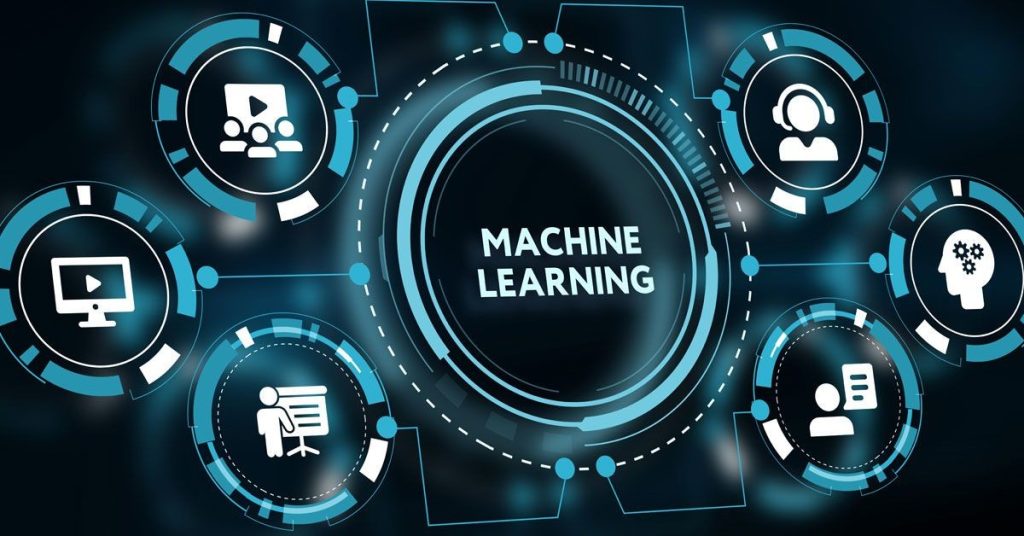By allowing systems to learn from data, get better over time, and make decisions with little assistance from humans, machine learning (ML) is transforming a number of industries. The foundation of artificial intelligence, this technology is used in many domains to solve challenging issues, boost productivity, and stimulate creativity. Some of the most significant machine learning applications in various industries are examined in this article.

Healthcare
Through better patient care, diagnosis, and treatment, machine learning is greatly improving healthcare. Important uses consist of:
- Medical Imaging: ML algorithms are used to analyze medical images (X-rays, MRIs, and CT scans) in order to accurately detect diseases like cancer, neurological disorders, and cardiovascular conditions.
- Predictive analytics: By examining patient data, machine learning models forecast readmission rates, patient admissions, and disease outbreaks, allowing for proactive healthcare management.
- Drug Discovery: By identifying possible drug candidates, forecasting their efficacy, and streamlining clinical trials, machine learning (ML) speeds up the drug discovery process.
Finance
Machine learning is used in the finance sector to improve customer experience, manage risks, and make better decisions. Important uses consist of:
- Fraud Detection: Machine learning models examine transaction patterns to identify and stop fraudulent activity instantly.
- Algorithmic Trading: To optimize profits, machine learning algorithms evaluate market data and place trades at the best times.
- Credit Scoring: By examining a borrower’s financial history and other pertinent information, machine learning models determine creditworthiness and produce more precise credit scores.
Retail
Machine learning is transforming retail by personalizing customer experiences, optimizing supply chains, and improving inventory management. Key applications include:
- Recommendation systems: Machine learning algorithms examine consumer preferences and behavior to make product recommendations that boost revenue and customer satisfaction.
- Demand Forecasting: ML models forecast future demand by examining past sales data and market trends, which aids retailers in cost-cutting and inventory management.
- Customer Segmentation: Targeted marketing and customized promotions are made possible by machine learning, which assists retailers in segmenting their customer base according to purchasing patterns.
Manufacturing
Machine learning enhances manufacturing processes by improving efficiency, quality control, and predictive maintenance. Key applications include:
- Predictive maintenance: It lowers downtime and maintenance expenses by using machine learning models to forecast equipment failures through sensor data analysis.
- Quality Control: Algorithms that use machine learning scan products for flaws and guarantee that high standards are fulfilled.
- Supply Chain Optimization: ML models optimize supply chain operations by examining demand patterns, which lowers waste and boosts productivity.

Transportation and Logistics
Machine learning is revolutionizing transportation and logistics by optimizing routes, improving safety, and enhancing customer service. Key applications include:
- Autonomous Vehicles: By using machine learning algorithms, self-driving cars can navigate, identify objects, and make decisions in real time, increasing efficiency and safety.
- Route Optimization: To identify the most effective routes for delivery and transportation services, machine learning models examine weather and traffic patterns.
- Fleet Management: Machine learning aids in tracking vehicle conditions, anticipating maintenance requirements, and streamlining fleet operations.
Marketing and Advertising
By enabling tailored campaigns, optimizing ad spend, and enhancing customer engagement, machine learning is revolutionizing marketing and advertising. Important uses consist of:
- Personalized Marketing: By using machine learning algorithms to evaluate consumer data, marketers can send more engaging and conversion-rate-boosting messages.
- Ad targeting: Using data from user behavior and preferences, machine learning models target the appropriate audience and optimize ad placements.
- Customer Insights: ML helps businesses customize their strategies by offering insights into customer preferences and trends through the analysis of customer feedback and behavior.
Education
By supporting teachers, increasing administrative effectiveness, and personalizing learning experiences, machine learning is improving education. Important uses consist of:
- Personalized Learning: By adjusting the pace and content of instruction to each student’s needs, machine learning models improve learning results.
- Automated Grading: By using machine learning algorithms to grade assignments and tests automatically, teachers can save time and give students immediate feedback.
- Student Performance Prediction: By analyzing student data, machine learning (ML) can forecast academic performance and identify students who may be at risk of falling behind, allowing for prompt interventions.
Cybersecurity
Machine learning plays a crucial role in cybersecurity by detecting threats, preventing attacks, and enhancing overall security measures. Key applications include:
- Threat Detection: Machine learning algorithms examine user behavior and network traffic to identify and stop cyberthreats instantly.
- Anomaly Detection: Proactive actions are made possible by machine learning models that spot odd activity and possible security breaches.
- Phishing Prevention: By examining email content and sender behavior, machine learning algorithms identify and stop phishing attempts.

Conclusion
Applications of machine learning are numerous and diverse, revolutionizing sectors and enhancing daily life. Machine learning boosts productivity, stimulates innovation, and offers individualized experiences in a variety of industries, including healthcare, finance, retail, and education. Machine learning’s ability to solve challenging issues and open up new possibilities will only increase as technology develops further, influencing many industries as well as our day-to-day interactions.